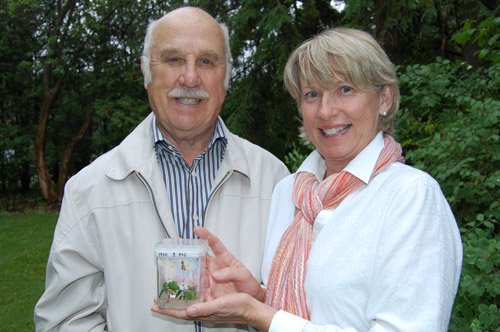Scientists Use Cloning to Overcome Dutch Elm Disease
June 17, 2010 - News Release
University of Guelph plant agriculture researchers plan to repopulate American elms by developing new techniques for cloning and producing trees resistant to its biggest killer - Dutch elm disease.
The research project is featured in today's Globe and Mail.
The popular trees, which at one time lined boulevards and decorated city centres, were almost wiped out in Ontario in the 1970s by a fungal infection that prevents nutrient transport in the tree.
Profs. Praveen Saxena and Alan Sullivan aim to bring back the American elm population through micropropagation, based on selecting tissue samples from surviving disease-resistant trees.
The samples are taken from the trees’ growing points in roots or stems to grow mass numbers of new plantlets that are genetic clones.
Duplicating disease-resistant elms is no easy task because only one of about every 100,000 elm trees has natural resistance, said Saxena.
“Other elms still in existence may have simply managed to escape infection. Unless the tree’s tissues are disease-resistant, there’s no guarantee that they wouldn’t fall victim to Dutch elm disease again.”
Cell culture technology allows the researchers to select germplasm with the desired traits.
The Guelph researchers are working with trees in the U of G Arboretum and across Canada to identify and develop a germplasm that is completely resistant to Dutch elm disease. That will allow them to grow thousands of genetically identical plants with the same disease resistance.
“To our knowledge, no truly disease-resistant germplasm currently exists,” said Saxena. “Instead, most surviving elms have shown varying degrees of tolerance to the disease.”
At the moment, the researchers have used micropropagation techniques to grow what are potentially disease-tolerant clones. These clones will need further testing to determine whether they are completely disease-resistant.
“The end goal is to gradually reintroduce the disease-resistant trees into their natural environment,” said Sullivan.
Funded by the Gosling Foundation, a non-profit organization for ecological preservation, protection and education outreach, the research project is just a starting point.
“This program may help preserve thousands of other endangered plant species around the world,” said Saxena. “The need to conserve endangered plant species in provinces, such as Ontario, where urban sprawl continues to grow is crucial and urgent.”
 For Philip and Susan Gosling, the co-founders of the Gosling Foundation, seeing the American elm restored to its rightful place in cities and ecosystems is what ultimately lies at the heart of this research.
For Philip and Susan Gosling, the co-founders of the Gosling Foundation, seeing the American elm restored to its rightful place in cities and ecosystems is what ultimately lies at the heart of this research.
“Hearing again the musical greeting calls of the northern oriole each spring from the stately elm tree will bring joy to all observers and naturalists,” said Philip Gosling.
Added Susan Gosling: “We want to conserve and propagate the American elm and many other rare and endangered Canadian native species so that we can start to replace what has been decimated along the way. And we feel that this is a perfect connection between our foundation and the expertise at the University of Guelph.”
Contact:
Prof. Praveen Saxena
Department of Plant Agriculture
519-824-4120, Ext. 52495
psaxena@uoguelph.ca
For media questions, contact Communications and Public Affairs: Lori Bona Hunt, 519-824-4120, Ext. 53338, or l.hunt@exec.uoguelph.ca, or Deirdre Healey, Ext. 56982 or d.healey@exec.uoguelph.ca.